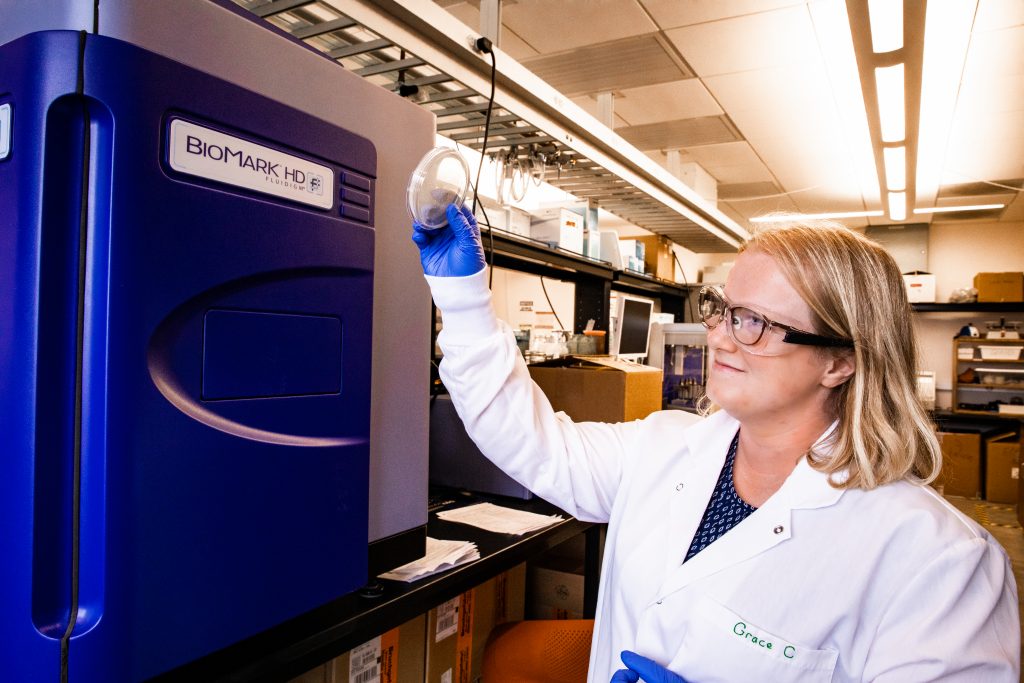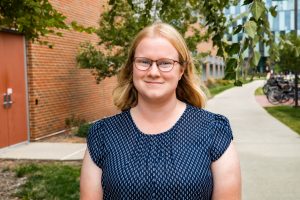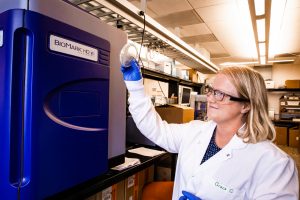Here to make a change: Grad student Grace Carey receives Brown Graduate Fellowship, empowered to study sustainable agriculture
Author: Sarah Hays
Author: Sarah Hays

One of only twelve awardees at Iowa State University, microbiology student Grace Carey, housed in the Department of Agricultural and Biosystems Engineering, received the $10,000 prestigious Brown Graduate Fellowship. Carey’s path to where she is today, a third-year, successful doctoral student, was a hard-earned path paved with her drive for environmental justice and passion for sustainable agriculture.
As a young teenager, Carey grew up in a rural and remote area in a lower-income family. In times when her family couldn’t afford much, Carey used her love for being outside and in the soil to help provide as much as she could. And she was good at providing for her family – maintaining a 5,000-square-foot garden full of fruits and vegetables, a luxury food that her family couldn’t afford at the time.
Managing and growing all of these fruits and vegetables was part of the reason Carey was inspired to pursue her passion for soil health and sustainable agriculture, she said.
“I grew up in a pretty rural area, and I was put in charge of maintaining my family’s 5,000 sq ft garden when I was just a young teen, and I loved it,” Carey said. “It was empowering, it was exciting, it was amazing to be able to provide high-quality food to my family because we were very low income, and fruits and vegetables were very expensive, so it was a really precious commodity. Being able to actually have the power, despite the fact that I didn’t have any money at the time, to provide substantially for my family’s well-being was very exciting. I love doing things outside, I love being outside working with the soil, and so that was a really positive thing that drove me towards being interested in sustainable agriculture.”
But the empowerment of providing for her family sustainably wasn’t the only reason Carey pursued microbiology. Part of her passion was sparked from a different perspective she had from growing up in a rural and low-income area.
“At the same time, there was a slightly more cautionary side that interested me in sustainable agriculture,” Carey said. “When you live in more remote or rural areas, people are able to get away with doing things that are not environmentally friendly. Some places were dumping grounds for dead animals that were not approved by the FDA, there was greywater that was just poured into your backyard and left to evaporate, and over time I started noticing these things and thinking, ‘I don’t think this is okay. What are ways that we can support our families but keep the environment clean at the same time?’”
Combining the empowerment and eye-opening moments of Carey’s past inspired her to make a change – to make sustainable agriculture more cost-effective and practical for farmers to use.
When Carey left home, she attended a community college that gave her an opportunity to have a summer internship at the Williams lab at Virginia Tech. The lab was exactly what Carey wanted – a soil microbiology lab, studying how to create a world with more accessible sustainability.
After graduating from Virginia Tech with a bachelor’s degree, Carey pursued her PhD at Iowa State University in microbiology. Housed in the G.E.R.M.S. lab in ABE with Adina Howe, Carey became intertwined with Iowa State, the supportive environment, and her mission. And now, Carey is flourishing as a successful student with a prestigious fellowship from the university, nominated by her major professor, Adina Howe.
“Grace is a fantastic person. She is full of optimism, spirit, and energy,” Howe said. “She is a great contributor to our team. She is an ideal Brown Fellowship recipient because she is doing cutting-edge research on how plants within a conservation practice that are already used to help water quality, may also help to remove antibiotic-resistant bacteria. Her research is helping us understand links between agriculture, conservation and soil and water quality.”
For Carey, this fellowship will give her opportunities that she wouldn’t have without the funding, including visits to see her family back home in Virginia and to support her health and well-being as a grad student.
“The $10,000 is going to be a huge support to me as I go through the next few years of grad school,” Carey said. “It will help support health and well-being, I will be able to afford things that I hadn’t been able to afford before, and it’ll make it possible for me to see my family more often – my ability to see my family before this was going to be more restricted, and now I’m just really thankful that I have this opportunity.”
After graduation, Carey is interested in working in research and development in industry, ideally with a biotech company that uses microbiology to promote sustainable agriculture.
“I want to be able to engage with the people from the situations where I used to be, where you don’t necessarily see a future for yourself in STEM, you don’t know if you’re capable of it, and it really just takes a few people coming together to empower you and to move you forward,” Carey said. “So I want to be able to do that for other people.”